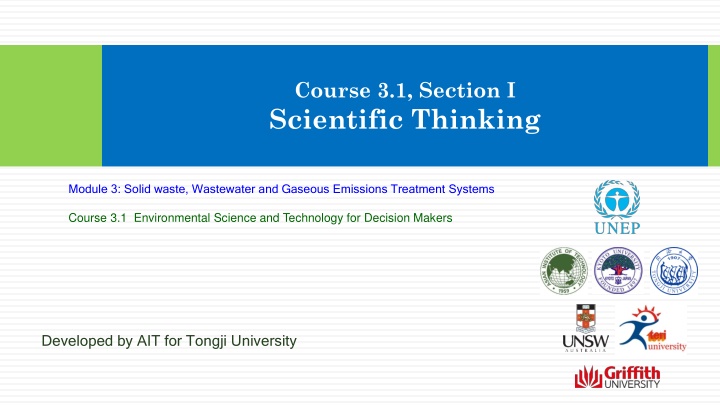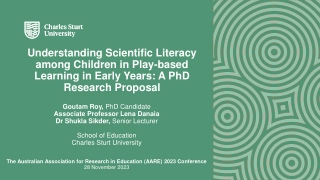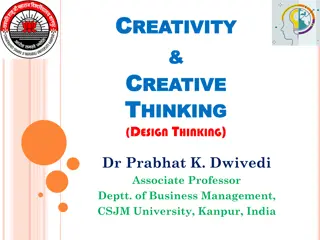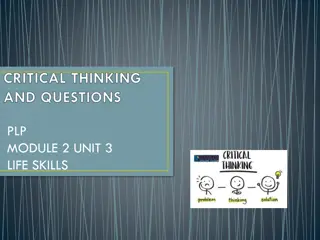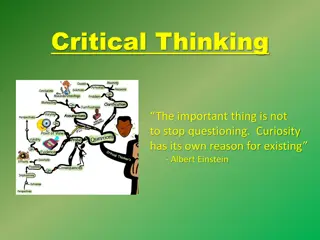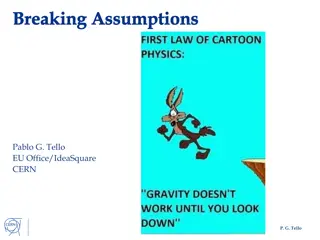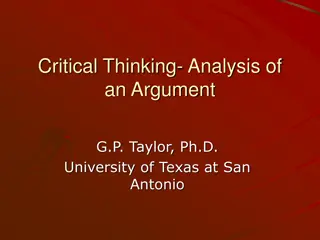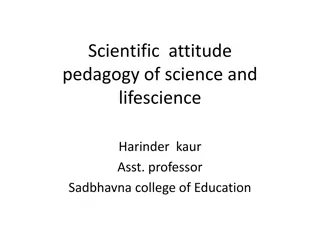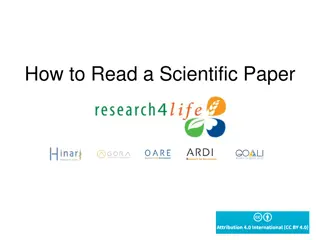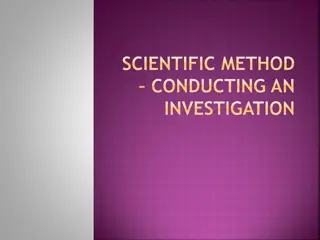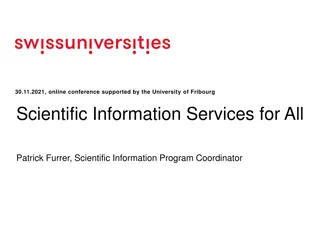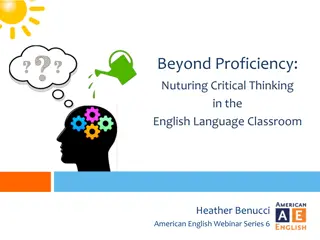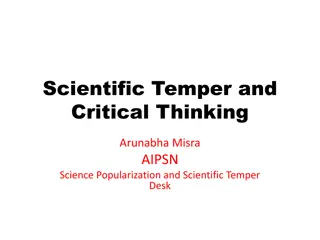Scientific Thinking
In this course module, explore the linkages between environmental themes such as human population growth, sustainability, global perspective, and more. Understand the scientific method, its essence, assumptions, and step-by-step approach for testing ideas through observations. Dive into solid waste, wastewater, and gaseous emissions treatment systems from a scientific thinking perspective.
Download Presentation

Please find below an Image/Link to download the presentation.
The content on the website is provided AS IS for your information and personal use only. It may not be sold, licensed, or shared on other websites without obtaining consent from the author.If you encounter any issues during the download, it is possible that the publisher has removed the file from their server.
You are allowed to download the files provided on this website for personal or commercial use, subject to the condition that they are used lawfully. All files are the property of their respective owners.
The content on the website is provided AS IS for your information and personal use only. It may not be sold, licensed, or shared on other websites without obtaining consent from the author.
E N D
Presentation Transcript
Course 3.1, Section I Scientific Thinking Module 3: Solid waste, Wastewater and Gaseous Emissions Treatment Systems Course 3.1 Environmental Science and Technology for Decision Makers Developed by AIT for Tongji University
Recap from the Last Lecture Urban environmental problems: understanding the scale Science and Technology Environmental Science and its Major Themes Human Population Growth Sustainability A Global Perspective An Urbanizing World People and Nature Science and Values Is there linkages amongst these THEMES? Is there a need for SCIENTIFIC THINKING? Let us see the following example o o o o o o 2 Module 3: Solid waste, Wastewater and Gaseous Emissions Treatment Systems
Environmental Problems & Scientific Thinking Describe the linkages amongst themes as visualized by you o Human Population Growth o Sustainability o A Global Perspective o An Urbanizing World o People and Nature o Science and Values Is there Scientific Thinking behind these linkages? 3 Module 3: Solid waste, Wastewater and Gaseous Emissions Treatment Systems
Scientific Method: Essence: Disprovability Assumptions: Events in natural world follows patterns that can be understood through careful observation and scientific analysis These basic patterns & the rules the same throughout the universe Science based on a type of reasoning known as induction; begins with specific observations about natural world and extends to generalizations Generalizations subjected to tests that may disprove them (If such a test cannot be devised, then a generalization cannot be treated as a scientific statement) Although new evidence can disprove existing scientific theories, science can never provide absolute proof of the truth of its theories 4 Module 3: Solid waste, Wastewater and Gaseous Emissions Treatment Systems
Scientific Method: A step-by-step method for testing ideas with observations o Observations are anything you can sense? o How do you sense things? See, hear, smell, touch, taste Observations must be o Measurable o Repeatable o Controllable 5 Module 3: Solid waste, Wastewater and Gaseous Emissions Treatment Systems
Scientific Method: Hypotheses: Tentative explanations of the observations or educated guesses Predictions result from hypotheses o usually seen in the form of if then statements For example: o My car won't start is an observation o The battery in my car is dead is a hypothesis o If I replace my car battery with a brand new battery then it will start is a prediction 6 Module 3: Solid waste, Wastewater and Gaseous Emissions Treatment Systems
Scientific Method: Scientists use educated guesses called hypotheses to generate predictions o that are then tested experimentally Results may reject or fail to reject a hypothesis Results never confirm a hypothesis, but only lend support to it by failing to reject it This means we never prove anything with this method 7 Module 3: Solid waste, Wastewater and Gaseous Emissions Treatment Systems
Scientific Method: Make observations ... Ask questions of some phenomenon Formulates a hypothesis o statement that attempts to explain the scientific question Hypothesis used to generate predictions o specific statements that can be directly tested. Results either support or reject the hypothesis 8 Module 3: Solid waste, Wastewater and Gaseous Emissions Treatment Systems
Scientific Process: Part of a Larger Process Scientific process includes peer review, publication, and debate Consistently supported hypothesis becomes a theory o A well-tested and widely accepted explanation With enough data, a paradigm shift can occur o A change in the dominant view 9 Module 3: Solid waste, Wastewater and Gaseous Emissions Treatment Systems
Experiments Natural or correlational ones are often necessary Manipulative experiments are strongest (a) Manipulative experiment (b) Natural experiment, or correlational study 10 Module 3: Solid waste, Wastewater and Gaseous Emissions Treatment Systems
Measurements & Uncertainty Every measurement only an approximation Measurement uncertainties inevitable o Can be reduced o Can never be completely eliminated A measurement is meaningless unless it is accompanied by an estimate of its uncertainty 11 Module 3: Solid waste, Wastewater and Gaseous Emissions Treatment Systems
Sources of Uncertainty Experimental Errors o Measurement uncertainties and other errors occur in experiments Systematic Errors o Errors occurring consistently (e.g resulting from incorrectly calibrated instruments) 12 Module 3: Solid waste, Wastewater and Gaseous Emissions Treatment Systems
Accuracy & Precision Accuracy o Extent to which a measurement agrees with the accepted value Precision o Degree of exactness with which a quantity measured 13 Module 3: Solid waste, Wastewater and Gaseous Emissions Treatment Systems
Hypothesis, Theory, and Paradigm Hypothesis: an educated guess, to be tested Theory: a well-tested and widely accepted explanation of the observations, validated by much previous research Paradigm: a dominant view. May shift if new results show old results or assumptions to be wrong 14 Module 3: Solid waste, Wastewater and Gaseous Emissions Treatment Systems
Scientific Method Feedback: the most important feature of the scientific method Allows for self reflection The data looked at from different points of view Allows us to test different but related hypotheses Creates opportunities to find multiple reasons to confirm our hypothesis 15 Module 3: Solid waste, Wastewater and Gaseous Emissions Treatment Systems
Environmental Perspectives Scientific Process at work Provides a linear path to knowledge with positive and negative feedback loops Requires repeated observation of the same thing, over and over again Some times repeated observations not possible Need to be able to measure something (testable?) Need to be able to control things Need to be able to define things Can't prove something to be true only that it is false Feedback goes on at each level in the scientific method 16 Module 3: Solid waste, Wastewater and Gaseous Emissions Treatment Systems
Thank You 17 Module 3: Solid waste, Wastewater and Gaseous Emissions Treatment Systems
